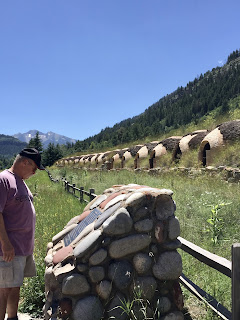Back on November 5th, John Floyd wrote a SleuthSayers blog about three stories he had published in AHMM this year. In the article's conclusion, he asked several questions concerning what elements of writing other authors published in AHMM had used, such as Point of View, sub-genre, series vs. standalones, etc.
As I lag along in John's footsteps, you can easily see the difference in the size of our prints. For one thing, I only have about 160 published short stories, whereas John has about eight or nine times that many. In any case, I was going to answer some of his questions in the comment section, except that my answers kept getting longer and longer, therefore I turned those answers into my own blog and here it is.
The first story I sold to AHMM was a standalone set in the Golden Triangle of Southeast Asia and is not part of the much later 9 Tales from the Golden Triangle series. At the time, the AHMM website said that then editor Kathleen Jordan was looking for stories set in an exotic location. In my mind, the area of the Golden Triangle (Burma, Laos and Thailand) fit the bill for an exotic location, so I submitted my story and she published it. I was launched.
After that, I had to come up with something new in hopes that I wasn't just a one-trick pony. The result was the 9 Twin Brothers Bail Bond series. Ten stories in AHMM, in which the reader solves each mystery at the same time the story characters do and with the same clues. It seems the Proprietor in this series only accepts special clients, who subsequently end up falling from high places, being run over by an errant taxi cab (but then they were outside the painted lines of the crosswalk at the time), go deep water swimming without the proper breathing apparatus, get crosswise with their homicidal partner, or are otherwise rendered deceased, yet the bail firm always made a profit. These stories are told in 3rd Person from the POV of the lowly and long-suffering bail bondsman, Theodore. All titles contain some form of the words bail or bond in them. Sayings of Mahatma Gandhi are prominent in many of the stories, however the meanings of these sayings are now sinister, not at all what the great pacifist had intended.
The next series was The Armenian, a trader of goods along the Cossack cordon on the Terek River and south of the river into Chechen country. As a neutral party in the long-standing conflict between Muscovy forces and Chechen hill tribes, The Armenian is often tasked with finding a resolution for local crimes. 9 published stories in all, 6 of them published in AHMM. All were told in 1st Person from the viewpoint of either The Armenian or the Little Nogai Boy. These historical mysteries are set in the 1850s when Russian Tsars were expanding the empire. (9 Historical Mysteries Vol 1 & 2)
Next was the 1660s Paris Underworld series involving a young, orphan, incompetent pickpocket trying to survive in a criminal enclave. Naively considering himself to be good at his profession, he is often drawn into the schemes and scams of others. 9 published stories in all of which 8 were published in AHMM. All are historical mysteries told in 1st Person POV. (9 Historical Mysteries Vol 1 & 2)
Since humor keeps me sane, I soon turned to humorous capers with the Holiday Burglars series. 13 stories total with 12 published in AHMM. All the capers and titles concern well-known holidays, plus there is a double meaning on the titles. Told in 3rd Person, story characters Beaumont and Yarnell become involved in several bungled burglaries. (9 Holiday Burglars Mysteries)
My 9 Tales from the Golden Triangle series could be considered as an historical thriller set in the mountain jungles and opium fields of Burma, Laos and Thailand during the Vietnam War. Two half-brothers from different cultures vie to see who will inherit their warlord father's opium empire. 9 stories of which 7 were published in AHMM. All are told in 3rd Person POV with much of the plot based around old country Chinese proverbs.
And then, there is my Prohibition Era series of which one story has been published in AHMM and one has been bought but not yet published. The 3rd story was rejected, so it cannot truly be called a series yet. However, I recently submitted another story in this hoped-to-be-series. All are told in 3rd Person POV.
One of my standalones won the 2022 Edgar, but the storyline and background are not conducive to turning this story into a series.
Of course, there were also potential series which died aborning. They didn't get past the 2nd submission before I saw the rejection handwriting writ upon the wall.
There was the EZ Money Pawn Shop series. Two rejections and out. I even interviewed a real pawn shop manager, and believe me, he was uneasy about the whole deal. Not sure what he had to hide. Stories told in 3rd Person.
For the Bookie series, I interviewed a real bookie. Again, two rejections and out. Told in 1st Person. I was surprised the bookie consented to be interviewed, but then he did almost marry into the far edge of our extended family. He might have erroneously thought it was good for one Get-Out-of-Jail-Free card.
The 1900s French Indo-China series, using the old capitol of Hue along the Perfume River as background. Told in 1st Person. Two and out, with a 3rd one abandoned in mid-story.
The Exterminator series concerning a scheming family of bug exterminators working their scams through their fake business. One and out with two more on the plotting board. Told in 3rd Person.
ETC.
Even with 49 stories sold to AHMM, I guess some stories just aren't destined to become a series.
One last set of facts. Most of my AHMM stories run from 3,500 words to about 5,000 words, with two topping out in the neighborhood of 8,000 words. Each story took as many words as was needed to tell that particular story.
Reading back over this article, I think the AHMM editor and I would agree that if I ever got that first story (a standalone at that point) published, then more than likely I would try to turn those characters and their situation into a series. Why not?
HAPPY HOLIDAYS to all !!!
























